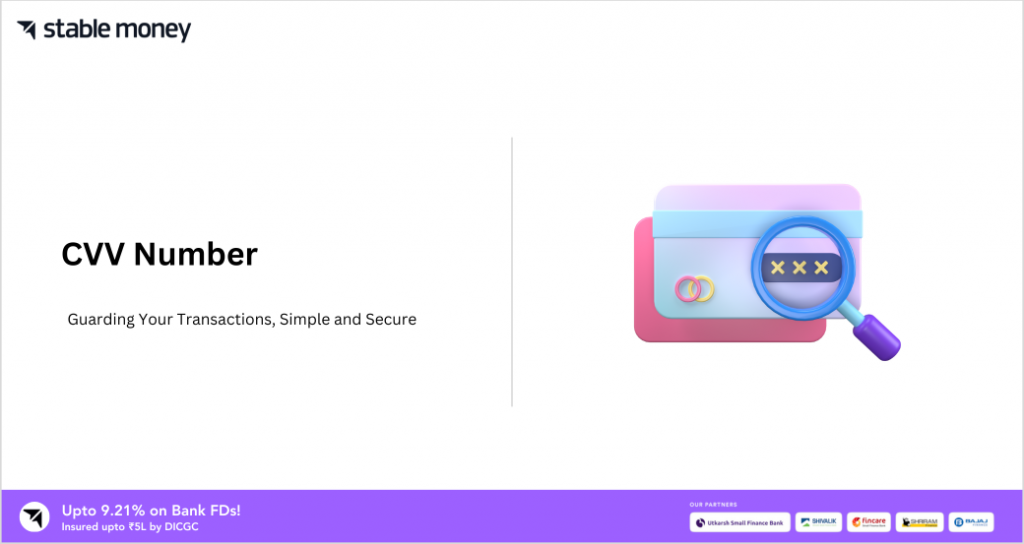
Have you ever been asked to enter your CVV number while shopping online? CVV number is a secure code that stands for card verification value and is one of the most crucial numbers on your credit and debit cards. In this guide, you will learn the definition of CVV, its uses, advantages, and a lot more. So, read on to find out more:
What is CVV Number on a Credit Card
The CVV code complete form is Card verification value, and it is an essential number that is present on every debit and credit card and plays a crucial role in finalizing online transactions. This CVV number should be kept confidential and never disclosed to anyone. The issuers of credit cards produce CVV numbers depending on the below-mentioned details:
- Card number
- Card expiry date
- Issuer unique code
- Service code
There are other acronyms for this security feature, as mentioned below:
| Acronym | Issuer | Definition |
| CID number | Discover | Card Identification Number |
| CVC2 number | Master Card | Card Verification Code |
| CVV2 number | Visa | Card Verification Value 2 |
| CSC number | Debit Card | Card Security Code |
Where is the CVV Number Located on the Card
Just like your card number and its expiration date, the card verification value CVV number is also present on your card directly, but its location depends on the network you are using. For example, VISA, Discover, and Master cards have a three-digit CVV number that is located at the back of the card beside the cardholder’s signature box. However, the CVV number is four digits in American Express cards and is located at the front part.
What is the Purpose of Having CVV Number on the Card
Many people wonder what a cvv in a debit card. Well, the answer to this is quite simple! The main purpose of CVV numbers is to prevent fraud and conning activities that are on the rise in today’s digital world. It was devised so that banks can request another set of numbers, in addition to the card number, for authentication purposes. It is because hackers have become so advanced these days that they can easily get their hands on the card numbers using unscrupulous means but extracting the CVV number is not easy. Thus, the CVV number on the debit card adds an extra layer of protection and serves as an authentication mode while making transactions, eliminating the risk of falling prey to fraudulent activities.
Characteristics & Importance of CVV Number on Card
1. The Characteristics of CVV Number
- The initial part of the CVV is encoded within a magnetic strip, safeguarding vital card information.
- Upon swiping the card through a card reader machine, the device decodes the encrypted information stored on the magnetic strip, extracting your Debit Card number and additional details.
- The latter portion of the CVV comprises a set of three-digit codes. It is crucial to keep these codes private, as they play a vital role in the successful completion of online transactions.
2. The Importance of CVV Number
- It adds a security layer and prevents the confidential data of cardholders to getting into the wrong hands.
- It is essential for making purchases online and performing other transactions.
- CVV number signifies that the person making an online transaction also possesses the debit/credit card [physically while making a payment.
Can a Credit Card & Debit Card Have the Same CVV Number
CVV numbers are generated by the card issuer bank or company and printed on the debit or credit card. In general, no two cards have the same CVV number, considering the security factor. Thus, your credit and debit cards are not likely to show the same CVV number.
Is CVV Number Helps to Protect You Against Fraud
CVV CVC number adds an extra security measure for transactions conducted online. The primary function of a CVV in a debit card or credit card is to verify the legitimacy of the individual who is attempting a purchase. It helps in confirming their authorization to use the associated card. Even in the event that unauthorized individuals obtain your credit card details, such as your card number and expiry date, the absence of the CVV number renders the information insufficient for unauthorized usage.
Hence, you can say that the card verification value on a debit card serves as a shield, safeguarding your credit card from potential online fraud. In this manner, CVV numbers play a crucial role in preventing multiple forms of payment fraud, particularly those transactions that are made when a card is not physically available.
What is PIN?
The PIN is an abbreviation for Personal identification number and is not the same as your CVV number. The PIN is used while making transactions at ATMs or POSs, wherein you have to manually insert your card while making in-person transactions to complete the payment transactions. On the other hand, CVV means different and is a number used while making online payments over the phone, desktop, or similar devices.
Difference Between PIN & CVV
| PIN | CVV |
| It is usually a four-digit number | It is usually a three-digit code |
| Used for in-person transactions | Used for online transactions |
| It offers a static security feature | It offers a dynamic security feature |
| It is generated by the cardholder | Generated by the cardholder’s bank |
| It is a secret code that is not printed on the card | It is printed on card |
| Two or more cardholders may or may not have the same PIN | It is unique for every cardholder |
| PIN can be changed multiple times for the same card | CVV number cannot be changed by the user and only changes when a new card is issued |
If I lose My Card, Can I Get the Same CVV For My New Card?
No, if you sign up for a new card in case of theft or lost card, you will get a new debit/credit card with a new CVV number. The card security code CVV number changes when you replace the existing card, irrespective of the reason. The same case applies when your card expires, and you get a new card as a replacement for the same.
Can I Get The CVV Of My Preference
As mentioned above, a new credit or debit card will have a new CVV number. Also, since the CVV number is generated by banks and other credit card issuer companies, a cardholder cannot get their CVV changed as per their preference.
How CVV Is Generated
Initially, the CVV security code debit card number may seem like a random three or four-digit number, but this is not actually true. The CVV is generated by the bank or the card issuer company and itakes into account the cardholder’s account number, card expiry date, three-digit service code, and a pair of data encryption standards. Though the algorithm for generating the CVV code is unknown, the CVV is derived using these primary sources of information.
Advantages & Disadvantages of CVV Number in 2024
1. Advantages of CVV number
When you use your debit or credit cards manually at a POS or merchant store, you may not be asked for the CVV. All you need to enter is your PIN, and your transaction is approved. But when you are making online transactions over your phone or mobile, you may be required to enter your card credentials along with the PIN and CVV number to authenticate that the person using the card is authorized for the same.
You can define CVV as a barrier to fraudulent activities. The CVV number and the card expiry date are asked to ensure that the merchants receive payments from authorized and legitimate cardholders. In case a hacker is able to steal your card number and its expiry date but does not have your CVV number, they will not be able to use your cards at online stores and merchants where they mandate the need for a CVV number.
2. Disadvantages of CVV number
Although the Card Verification Value (CVV) enhances the security of online card transactions, it also has certain drawbacks and limitations, as mentioned below:
- Stored card information when you purchase from online merchants
- In the case of card skimming, CVV may not offer complete protection.
- Limited Protection Against Lost or Stolen Cards
- Phishing and Social Engineering tactics can compromise CVV security.
- It is not entirely foolproof.
- In transactions conducted in person or when the physical card is present, the CVV is generally not mandatory or verified, diminishing its efficacy in such situations.
Final Word
We hope this guide gives you an in-depth insight into CVV’s full form, its uses, CVV CVC’s meaning, and other associated details about CVV. CVV is an authentication tool and an additional security layer that safeguards your online transactions. But this is not foolproof and can be acquired by fraudsters, and you may fall prey to such scams if you do not stay alert. So, make sure that you never share such a confidential number or any other OTP number to stay safe from scams and fraud.
FAQs
No, you should never share your CVV number with anyone, and it should only be used while making online transactions. Anyone who tries to manipulate you and asks for your CVV number is secretly trying to steal your data. So, never share any kind of secret code with anyone.
If you enter the wrong CVV number while making payments, your transaction will be declined by the bank. Further, you can attempt the payment again after entering the right CVV number.
CVV is a security feature used by banks and follows different semantics while issuing CVV numbers. Generally, two people do not have the same CVV number.
Yes, while making online transactions, you might be required to enter your CVV number, which is absolutely legal to authenticate the payments. It is generally safe to use your CVV while shopping online.
While making in-person transactions, you are never required to enter your CVV number. But, while making online transactions, you are required to enter your card details, its expiry date, and also your CVV number. Usually, transactions without a CVV number are not approved for online transactions.
No, merchants may store your card number and expiry date so that you do not have to enter the card details time and again while shopping from the same store. But your CVV number is never stored by the merchant.
Disclaimer
This article is solely for educational purposes. Stable Money doesn't take any responsibility for the information or claims made in the blog.
